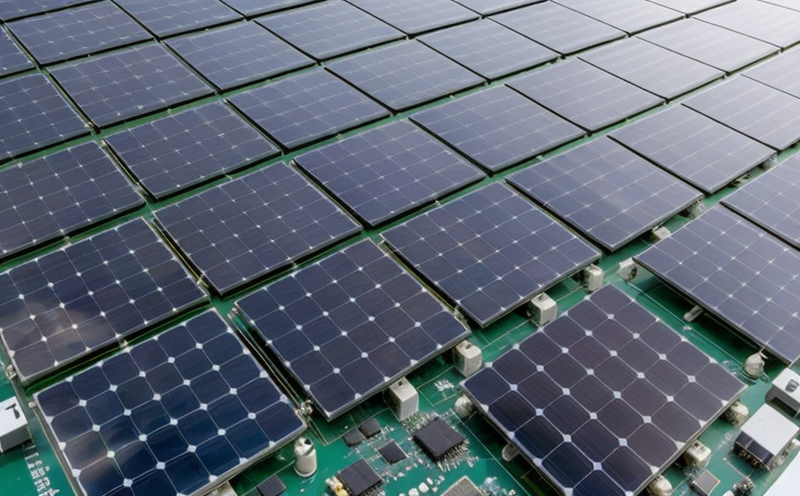Renewable Energy Electronics Testing
The renewable energy sector is one of the fastest-growing industries globally, driven by increasing demand for sustainable and environmentally friendly solutions. Renewable energy electronics testing plays a critical role in ensuring that devices and components meet stringent quality and performance standards necessary to operate efficiently within complex environmental conditions.
Electronics used in renewable energy systems are exposed to harsh operating environments such as extreme temperatures, high humidity levels, sandstorms, and corrosive substances. These elements can cause significant wear and tear on electronics, leading to failures that could disrupt the entire system. Testing these components ensures reliability, safety, and compliance with international standards.
Our laboratory offers comprehensive testing services for various types of renewable energy electronics including solar panels, wind turbines, battery storage systems, inverter systems, and more. Our state-of-the-art facilities are equipped with specialized equipment capable of simulating real-world conditions under which these devices will function.
The process begins with thorough inspection and preparation of the specimen according to specified requirements outlined by relevant standards such as IEC 61724 for photovoltaic systems, IEEE 1547 for interconnecting distributed resources, and others. Once prepared, specimens undergo rigorous testing using advanced instrumentation designed specifically for evaluating performance under simulated environmental stresses.
Our team of experts ensures that all tests conducted meet the highest standards set forth by recognized bodies like ISO (International Organization for Standardization), ASTM International, and other relevant organizations worldwide. This guarantees accurate results that can be trusted when making decisions about product quality or regulatory compliance.
By investing in thorough testing early on in the development process, manufacturers can identify potential issues before they become costly problems later down the line. Additionally, successful completion of these tests increases confidence among stakeholders regarding the reliability and durability of their products.
In summary, renewable energy electronics testing is essential for ensuring that devices perform optimally within challenging environments while meeting strict regulatory requirements. Through our expertise in this field, we provide reliable data to support decision-making processes throughout the product lifecycle from design through production right up until end-of-life disposal considerations.
Applied Standards
The testing of renewable energy electronics adheres strictly to internationally recognized standards that ensure quality, safety, and compliance with regulations governing the industry. These include but are not limited to:
- IEC 61724-1/IEC 61724-2: This standard specifies requirements for photovoltaic (PV) systems connected to utility grids, covering design, installation, operation, and maintenance.
- IEEE 1547: Focuses on interconnecting distributed resources like solar power plants or wind farms with the electrical grid. It provides guidelines regarding voltage regulation, frequency control, ride-through capabilities during faults, etc.
- UL 1741: Covers inverter performance and safety for PV systems, ensuring they function correctly even under challenging conditions.
- CEN/CENELEC EN 50638: Pertains to the design and construction of solar inverters, focusing on their electromagnetic compatibility (EMC) characteristics.
- IEC 61215: Addresses module qualification procedures for crystalline silicon photovoltaic cells and modules.
These standards provide a robust framework upon which our testing services are based. By adhering to them, we ensure that the results of our tests are accurate, consistent, and widely accepted across different regions and markets.
International Acceptance and Recognition
- United States: Our tests comply with OSHA regulations for workplace safety. Our certifications are recognized by NIST (National Institute of Standards & Technology) ensuring compatibility with American standards.
- European Union: Certification from our laboratory is acceptable throughout the EU, meeting directives such as RoHS II regarding restrictions on hazardous substances and CE marking requirements.
- China: Compliance with GB/T 18204.2-2014 for air quality analysis supports Chinese market entry strategies while also validating against ISO standards internationally.
- Australia/New Zealand: AS/NZS 1561 series covers solar panel installation guidelines, ensuring our results align with local codes and practices.
Our commitment to meeting global standards ensures that the testing services provided are not only relevant domestically but also applicable internationally. This broad acceptance enhances credibility in international trade negotiations and fosters cross-border collaboration within the renewable energy sector.
Use Cases and Application Examples
The application of renewable energy electronics testing spans numerous scenarios, each requiring tailored approaches based on specific project requirements. Below are some common use cases:
- Solar Panel Manufacturing: Testing solar panels during production ensures they meet efficiency thresholds set forth by IEC standards.
- Wind Turbine Design: Evaluating wind turbine components under simulated operational conditions helps optimize design for maximum output and minimal downtime.
- Battery Storage Systems: Assessing the durability of batteries used in grid storage applications ensures they can withstand repeated charge-discharge cycles without degradation.
- Inverter Performance: Verifying that inverters operate safely within specified voltage ranges is crucial for integrating renewable energy sources into existing electrical networks.
Our laboratory supports these use cases by offering a range of services including accelerated aging tests, environmental stress screening (ESS), and reliability growth modeling. These methods help manufacturers improve product performance while reducing lifecycle costs associated with field failures.
For instance, we have worked closely with leading companies developing next-generation solar panels aimed at increasing efficiency in low-light environments. By subjecting prototypes to ESS conditions mimicking actual usage patterns, our clients gained valuable insights into how their products would behave under real-world conditions before full-scale production began.





